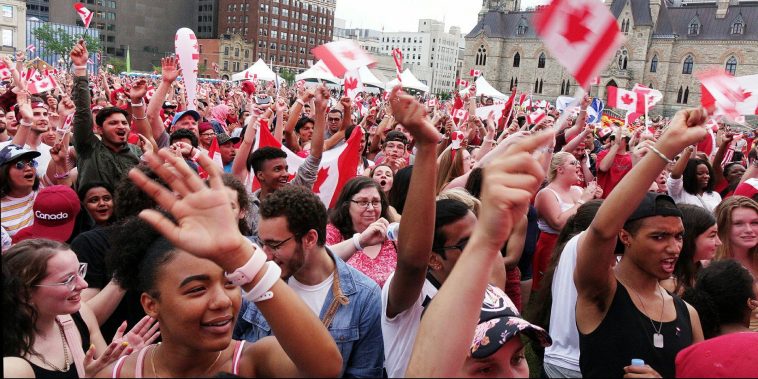The well-known stability of Canadian society appears to be under significant strain, according to a recently uncovered governmental report. This ominously vague document, drafted by none other than the Royal Canadian Mounted Police, similar to the FBI in the US, spells out the potential for significant socio-political upheaval. An academic lawyer acquired a portion of this classified report and shared it with the National Post, one of Canada’s primary news outlets.
WATCH: The line for a job interview at a liquor store in London, Ontario.
— Real News Now (@RealNewsApp) March 23, 2024
Entitled ‘Whole-of-Government Five-Year Trends for Canada,’ the report interestingly incorporates an assortment of forward-looking matters. Among these issues are concerns tied to climate change in Canada’s cool climes, a subject that aligns with the preferred narrative of progressivism. Here, though, the focus is on the evident outcomes of mass migration: skyrocketing housing costs, growing wealth disparities, and a dwindling sense of civic trust brought on by a diversity agenda perpetuated by the government.
The nearing economic downturn is expected to deepen the already evident schism in living standards, particularly between younger and older generations. Many Canadians under the age of 35, the report suggests, are likely going to be unable to afford homeownership. Worsening this decline in living conditions is the widening economic chasm; wealth disparity in developed nations currently is higher than it has been in generations.
Political polarization and societal division have dramatically increased over the past seven years, a global trend visible across western democracies. Opportunists tapping into this divide, including extremist factions with tailored populist messages, have gained immensely. Similar to the rest of the world, Canada has seen a rise in authoritarian tendencies amid liberal-democratic nations.
The report makes a case that conditions will likely worsen over the next five years. There’s a suggestion in the report that the civic-minded populism championed by Donald Trump may pose a threat to Canada’s establishment, recommending toward a more robust Canadian law enforcement architecture. However, a critical absentee from the report: the analysis of one obvious reason for Canada’s societal stress – their enforced policy of mass migration, rapidly promoting civic discord and reducing average income, productivity, and birth rates.
This expansive immigration agenda is being relentlessly pursued by Prime Minister Justin Trudeau, aligning with the demands of commercial groups. Trudeau’s progressive administration is ushering in approximately one million individuals every year into the country, approximately three new immigrants for every Canadian birth. Meaning, the influx is roughly twice as much relative to the population when compared with the strategy exercised by US President Joe Biden and his pro-immigration deputies.
The mass immigration policy is reportedly driving stock market gains even as it depresses wages, fuels inflation, escalates the unaffordability of homes, discourages marriages and childbirth, creates homelessness, and incites civil unrest among Canadians. A prime example is the decline in Canada’s productivity, as Trudeau’s immigration policy allows investors to gain from a consumer economy bolstered by the inflow of low-skilled foreign labor, renters, and consumers.
This strategy, grown from poverty, reduces the impetus on investors to seek growth through innovative productivity avenues that could elevate wages and wealth: technology, education, innovation, and trade. Further, this influx is reintroducing historic ethnic conflicts into what used to be a prosperous, high-trust, and stable nation.
As a result, politicians are steadily distancing themselves from the needs of average Canadians, and public opposition is being divided by the high migration and low productivity policies. So detrimental is this policy that leading economists are openly pinpointing the damage to Canada’s productivity and technology sectors.
‘Lower productivity almost always means lower living standards,’ warned Trevor Tombe, a Canadian economist, in 2023. The country’s latest productivity report indicates a troubling trend – product output per labor hour has fallen for the fourth consecutive quarter. Consequently, Canadian productivity is about 2 percent lower in early 2023 than it was a year earlier, reversing years of positive gains and setting Canada back to mid-2017 levels.
Most Canadian provinces noticeably trail the majority of U.S. states in economic output per person. Tombe provides some startling examples: Ontario’s per-person economic output approximates that of Alabama, while Quebec and Manitoba lag behind West Virginia. Even Alberta, which is doing better than the U.S. average, is trailing 13 percent behind the economic performance of California and almost a quarter behind New York.
In a surprise strategy shift, Trudeau’s government, on March 21st, announced a scaling back in his aggressive immigration policy. As immigration minister Marc Miller explained, it’s necessary to ensure that the volume of temporary residents entering the country stays ‘at a sustainable level.’ The proposed reduction targets a decrease from 6.5 percent to 5 percent of the population by 2026.
Prime Minister Trudeau is facing a sinking approval rating, with polls indicating a slip from 28 percent in January 2022 to a meager 21 percent in March 2024. Competing for public approval is the ‘Progressive Conservative Party of Canada’ currently standing at 36 percent, despite also supporting increased immigration. Meanwhile, the pro-Canadian ‘People’s Party of Canada’ appears to plateau at 3 percent.
While the report provides some alarming forecasts for the future of Canada, understanding the full impact of the situation is more challenging due to the heavily redacted state of the document. The frustration among Canadians is evident however, borne out by the plummeting approval ratings for Justin Trudeau’s government.
What remains to be seen is whether governmental responses, such as Trudeau’s proposed immigration pull back, will address the social frictions in a meaningful way, or if the mounting civic discord will steer the course of this nation’s future.



